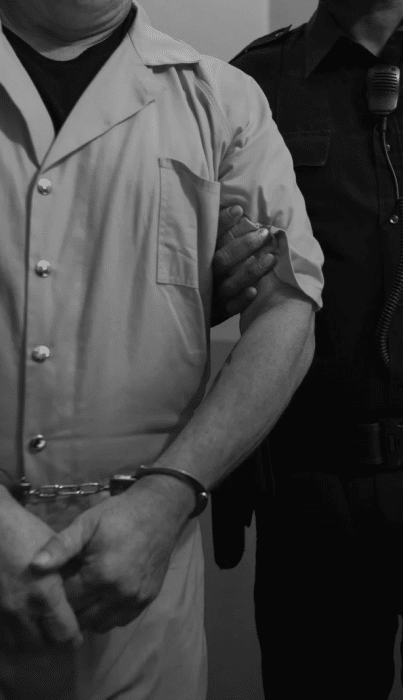Sexual Assault by Prison Guards
The U.S. Constitution and state and federal laws protect inmates against sexual assault by prison guards, but officers commit these crimes against inmates—regardless of gender—at the local, state, and national levels. The Police Brutality Center can help you understand your rights, the steps to take if a prison guard sexually assaulted you or a loved one, and how to get legal help and victim support.
Were you or a loved one a victim of police brutality?
Attorneys that work with Police Brutality Center may be able to assist you.
"*" indicates required fields
Content Last Updated: March 3, 2025
Sexual assault by prison guards can take several forms, including rape and unwanted touching. It is illegal at the state and federal levels for guards to have sexual contact with inmates, but it happens all too often.
It is a violation of your civil rights for a guard to sexually assault you, just as when the police engage in misconduct or abuse. In both situations, people with local, state, or federally granted powers take advantage of those under their control. It is critical to understand your rights, what to do after prison sexual abuse, and how to get legal help.
Statistics on Sexual Abuse in Prison
Sexual assault by prison guards happens regardless of gender, age, or sexual orientation. Men, women, children, and adults have all been victimized. Both men and women have been perpetrators. These assaults happen in jails and prisons at the local, state, and federal levels and in other types of detention facilities, including youth correctional institutions and immigrant housing
The U.S. Department of Justice reported that in 2018, there were 5,986 incidents of sexual misconduct by prison guards against inmates in federal and state prisons. This figure is more than double the 2,376 incidents reported in 2012. Large jail jurisdictions reported another 1,043 incidents of staff sexual misconduct against inmates.
According to the Bureau of Justice Statistics, 5.8 percent of incarcerated youth reported sexual misconduct by guards and other staff in 2018. This number included 6.1 percent of male youths and 2.9 percent of females.
It is difficult to get accurate statistics on the amount of prison sexual assault, partly because prison guards’ misconduct is underreported. Inmates are too often afraid to report those with authority over them.
Corrections officers can withhold privileges, cancel visitations, and invent reasons for disciplinary action or solitary confinement. Guards who have already proven themselves unworthy of protecting people may continue their assaults or coerce other inmates to do so.
It is also challenging to get accurate, up-to-date statistics because the agencies that compile them rely on local, state, and federal facilities to report sexual abuse accurately and promptly. A lack of reports can indicate that prisoners don’t feel safe reporting sexual abuse or that prison staff are hiding it.
Recent Cases
Recent cases of sexual assault by prison guards illustrate the problem’s extent and its effects on inmates. Here are some notable ones:

Effects of Inmate Sexual Assault
Sexual assault in prisons can have adverse psychological and physical effects on inmates.
The psychological effects of sexual abuse include anxiety, depression, self-blame, trouble sleeping, and post-traumatic stress disorder. Inmates who can’t get away from sexually abusive guards may live in constant fear.
There are also physical effects of sexual abuse by corrections officers, such as soreness, injuries, and the risk of sexually transmitted infections. Inmates afraid or ashamed to report their sexual abuse may go untreated, enhancing the crime’s physical and psychological effects.
The power dynamic within prison guard sexual abuse cases is similar to those involving police brutality. Corrections officers and the police know they are in charge and may use their power for sexual gratification or to humiliate, degrade, and demean the people they are supposed to protect.
Prisoners' Rights Against Sexual Abuse
The Constitution and state and federal law contain provisions to protect prisoners’ rights against sexual abuse, which also apply in situations of police misconduct. Below are some key protections to know:
Eighth Amendment protections against cruel and unusual punishment include an inmate’s right to protection against sexual assault, whether it involves sexual assault by guards or their failure to protect against sexual assault by other inmates.
The Fifth and 14th Amendments guarantee due process of law. The equal protection clause of the 14th Amendment protects you against unequal treatment based on race, creed, and sex. Guards who target victims of a certain race as a way of humiliating them commit 14th Amendment violations.
The Americans With Disabilities Act protects disabled prisoners who are targets of guard abuse.
The Model Sentencing and Corrections Act extends equal protection under the law, including sex, religion, national origin, and race.
While all states now have laws prohibiting sexual misconduct by guards, they vary in definitions and punishments. This lack of national standards complicates the process of seeking justice.
What To Do if You're a Victim of Sexual Assault by a Correctional Officer
If you or a loved one were the victim of a sexual assault by a prison guard, here are steps to take immediately:
- Collect documentation: Collect and preserve evidence of sexual assault, such as photographs, medical records, and clothing. Keep a journal with information regarding dates, times, and specific details of your sexual abuse.
- Report your abuse: As soon as possible, report your abuse to a senior guard, the warden, prison medical personnel, or others in charge of taking complaints.
- Seek medical attention: Tell the medical providers what happened. They'll examine you for signs of sexual assault and document and preserve any evidence they find.
- Follow prison administrative procedures: You must follow the administrative process of the prison where you are held before you can file a federal civil rights lawsuit. The Prison Litigation Reform Act requires you to exhaust all of your prison-level remedies, from filing your complaint through all available appeals, before you can file a federal lawsuit.
- File a Civil Rights of Institutionalized Persons Act complaint: This filing allows the Department of Justice to take action. It also can help shed light on problems in the prison and trigger an investigation.
- Consult with a civil rights attorney: An experienced civil rights attorney can tell you if state or federal law offers more protection based on the specifics of your case. They also can judge the quality of your evidence and request prison records or ask a judge to compel the prison to hand them over.
- File a civil rights lawsuit: File a federal civil action for deprivation of rights, or file a civil case in the state where your prison is located.
- Reach out for support: Use available prison resources, such as support groups, and talk to religious leaders, caseworkers, or other trusted staff members. Outside organizations that support prisoners' rights can help you find resources and take further action.
Legal Support for Victims of Sexual Assault by Prison Guards
At the Police Brutality Center, we have the resources to connect you with experienced, committed civil rights lawyers so that you can begin the process of pursuing justice. If you are considering filing a lawsuit or need legal advice, get legal help now.

